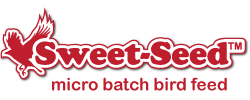Can I Use Honey in Hummingbird Nectar?

Honey is a natural sweetener and resistant to microorganism growth, so it should be ideal to make fresh, nutritious hummingbird nectar, right? Wrong! While honey can be delicious, using it in nectar can be dangerous and even fatal to hummingbirds
About Honey
Honey is a thick, viscous, syrupy liquid produced by insects that break down floral nectar. The exact chemical composition of honey depends on a variety of factors, including…
- The type of insect that produces the honey
- The type of flower nectar or plant sap transformed into honey
- Overall climate type, including humidity and temperature when the honey is produced
The sugars in honey are a combination of glucose and fructose, while the sugar in floral nectar is primarily sucrose. There are trace amounts of glucose and fructose present in floral nectar, depending on the exact flowers, but the concentration is far higher in honey.
Honey is rich and sweet, and is often preferred as a natural sweetener substitute in many cooking and baking recipes instead of adding extra sugar to foods. While honey can be a healthier option for many human foods, it isn't the best choice for feeding hummingbirds.
Why Honey is Bad for Hummingbirds
There are several reasons why honey isn't appropriate to feed to hummingbirds, either as a substitute in a sugar water recipe or to offer freely for birds to sip.
- Honey does not have the same chemical composition as floral nectar and is more difficult for hummingbirds to efficiently digest. This means the birds will get less energy and nutritional value from honey than from classic nectar or sugar water. Because hummingbirds need to maximize their energy intake to keep up on their active lifestyles, honey is not an ideal food option.
- Different bacteria and fungus that are naturally present in some types of honey are fatal to hummingbirds. When honey is diluted with water to be the proper consistency to feed birds, the extra water and oxygen in the mixture amplifies the fermentation of the honey so the bacteria and fungus grow much more quickly, infecting birds more easily.
- The sticky, syrupy texture of honey can easily coat the bills and feathers of hummingbirds, causing difficulties for the birds to feed or fly properly. This sticky goo can be difficult to wash away, particularly after it crystallizes, and birds that have gotten coated will be more vulnerable to predators and other threats.
- Honey, even diluted in water, will more easily clog the feeding ports of hummingbird feeders, restricting the flow of nectar and making it more difficult for birds to feed. Clogged ports can also become warped and cracked, leading to more feeder leaks and drips or making the feeder impossible to use properly.
- The sweetness of honey, both its taste and its enticing aroma, will attract other pests to the hummingbird feeder, including wasps, bees, ants, praying mantises and other insects, as well as raccoons and even bears in some areas. These visitors will not only keep hummingbirds from visiting, but can destroy feeders and may even be a danger to any both birds and birders.
With so many reasons why honey is not appropriate to feed hummingbirds, there is never a reason to offer it in hummingbird nectar.
Other Sweeteners to Avoid
In addition to honey, other types of sweeteners should not be used to make hummingbird nectar. Corn syrup, molasses and other sweetening syrups are never suitable, and beet sugar, raw sugar and powdered sugar are also inappropriate because they do not create the same nectar concentration and formula that is preferred by hummingbirds. Artificial sweeteners and zero-calorie sugar substitutes are also unsuitable because they do not provide hummingbirds with the appropriate caloric energy and nutrition they need.
Only plain, white table (granulated) sugar should be used to make homemade hummingbird nectar, or nectar concentrates or mixes that approximate floral nectar can be purchased to create healthy hummingbird nectar. No dyes or added flavors are necessary. With the best high-quality nectar, you'll soon see more hummingbirds visiting your feeders and you'll be able to enjoy more of these flying jewels every time you refill your nectar feeders.
